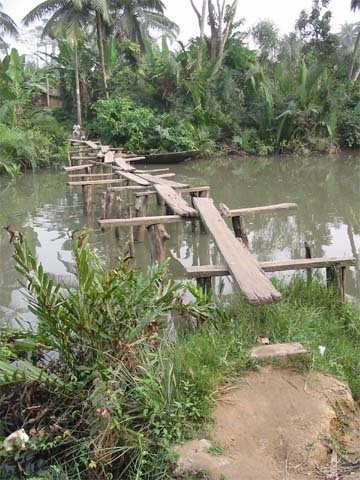By: Israel Umoh
Iko Town in Eastern Obolo Local Government Area of Akwa Ibom State is an oil-rich enclave. It bears a fanciful appellation that can easily lure a first-time visitor to the place. In an elementary interpretation, ‘Town’ could mean city or urban area.
To an average person, town connotes a well-developed area with pronounced social amenities. From regular electricity supply, macadamised roads, pipe-borne water garbed with urbane living among the residents and indigenes alike, a town is guaranteed.
But, Iko Town is ghost of itself, wearing urbane name but bearing a trapped outlook and rural garb. It is a paradox to meaningful development and is contrived in squalor and neglect by successive governments. Yet, a panoramic view of the ‘town’ shows a corresponding dossier with a typical rural area.
On Thursday, May 22, 2021, Straightnews team paid a fact-finding visit to Iko Town. From Ikot Akpaden-Okoroette Road to Iko Town, a first-time visitor is appalled that the town is another glorified place. The road is one-lane, and narrow with surging trees and growing grasses competing for space. Overtaking of vehicles is at the driver’s risk because the road is not well paved for manoeuvering of vehicles or motor cycles. Pedestrian walk is non-existent on a road leading to the pot of the nation’s wealth- crude oil.
At Ekperikpe Street is another eyesore. Shanties, huts, thatched houses reminiscent of war-torn, abandoned place greet visitors. ‘’Push-me-down,’’ ‘’Demolish me’’ ‘’don’t-live-in-me again’’ ‘’At-the-mercy-of-the-wind’’ ‘’I-go-die’’ dilapidated shanties and huts arrayed the street that should be seen as footpath.
Cracked walls allegedly caused by activities of some oil companies operating in the area, punchy roofs allegedly caused by acidic rain falling on them, cranky houses infested by poverty virus.
Yet, we saw women standing in front and processing cassava; others were seen frying garri. Kwashiokor-bellied children were diving into the shanties and huts that were at the mercy of encroaching erosion-prone area. Men with cracked lips and parched faces adorn the shanties. Both sides of the street are decked by the shanties. Some aged men and women occasionally peep from the makeshift huts at the strangers.
Along the street sits a restaurant. No food, but a sign post shows and directs visitors and customers to the place. It had a semblance of palm wine joint. Odour of cigarette smoke oozed out from the joint frequently patronized by some raunchy-looking girls and boys. One-storey building stands akimbo with leaking roof and holed-walls.
The rain-soaked soil melts approaching feet. White substance akin to salt floods the soil. Rain water drains and drips into the ever-running Ekpitim River ambushed by wild coconut trees. Stench of ill-disposed seafood, edible and cassava filled the air.
A resident of the Town, Helen Ekperikpe narrates ”Iko Town is an oil-rich place. Shell Petroleum Development Company exploited crude oil from this area for a long time. In 1995, the company abandoned and packed out. Later, Nigeria Petroleum Development Company moved and planted its rig. The company is operating three rigs in the area. It has about 15 oil wells.’’
”Most of the houses you seeing with damaged roofs are caused by acid rain caused as a result of effects of oil exploration. At times, the gas flaring has adverse effect on the health of the residents as acid rain will cause skin diseases,’’ the woman asserts.
”Unfortunately,’’ she avers, ‘’the oil company does not show interest in trying to improve the living conditions of the residents. The Company does not pay compensation to the rightful owners, does not sign a meaningful Memorandum of Understanding (MoU) with the host community.
”The company does not provide pipe-borne water. If it provides one, it will bring a standby generator on the day of inauguration and after the ceremony; the company goes away with the generator. And that is the end of that water project.
”The Federal and Akwa Ibom State are not helping matters too. For example, the state government set up revenue team head by the Secretary to the state government with Dr. Mbong Charles and other members. Yet, revenue collected is taken away leaving host communities with meager sum that may not enhance development of the area.’’
Iko Town has about 5,000 persons on the upland and 2,000 in the riverine. Dry taps are floated everywhere. At the entrance of the street stands towering but abandoned Water Tank. The rustic-looking water works was said to be constructed by SPDC IN 1972. Thereafter, the project was abandoned and it is standing as a monument for tourist attraction
Emmanuel Frank residing in the riverine Iko Town thanked God for the health of the people including children owing to the contaminated water they drink. ”People who drink treated water fall sick, but people who drink contaminated water are healthy. It is God’s grace.’’
At the mouth of the murky Ekpitim River are flying boats and peddlers while passengers were seen boarding flying boats and sailing to and from the riverine area. Passengers sailing to and off the coast to the hinterland were bringing mangoes and seafood for sale. Overlooking the river in what looks like Archipelago were rigs mounted by an oil company.
The fate of Iko Town befalls virtually all the oil-producing communities in the Nigeria’s South-South and South-East Regions. For example, Ibeno, Mkpanak and some Mbo villages in Akwa Ibom; Oloibiri in Bayelsa; oil-rich communities in Delta, Edo, Ondo, Abia, Imo and Edo States are grotto of deprivations and underdevelopment.
It could be a deliberate policy by the Federal and state governments to emasculate them from protesting against oil companies or a ploy to silence and consign them to perpetual slavery. Who knows? Is this not Blackman’s neocolonialism against fellow human beings?

